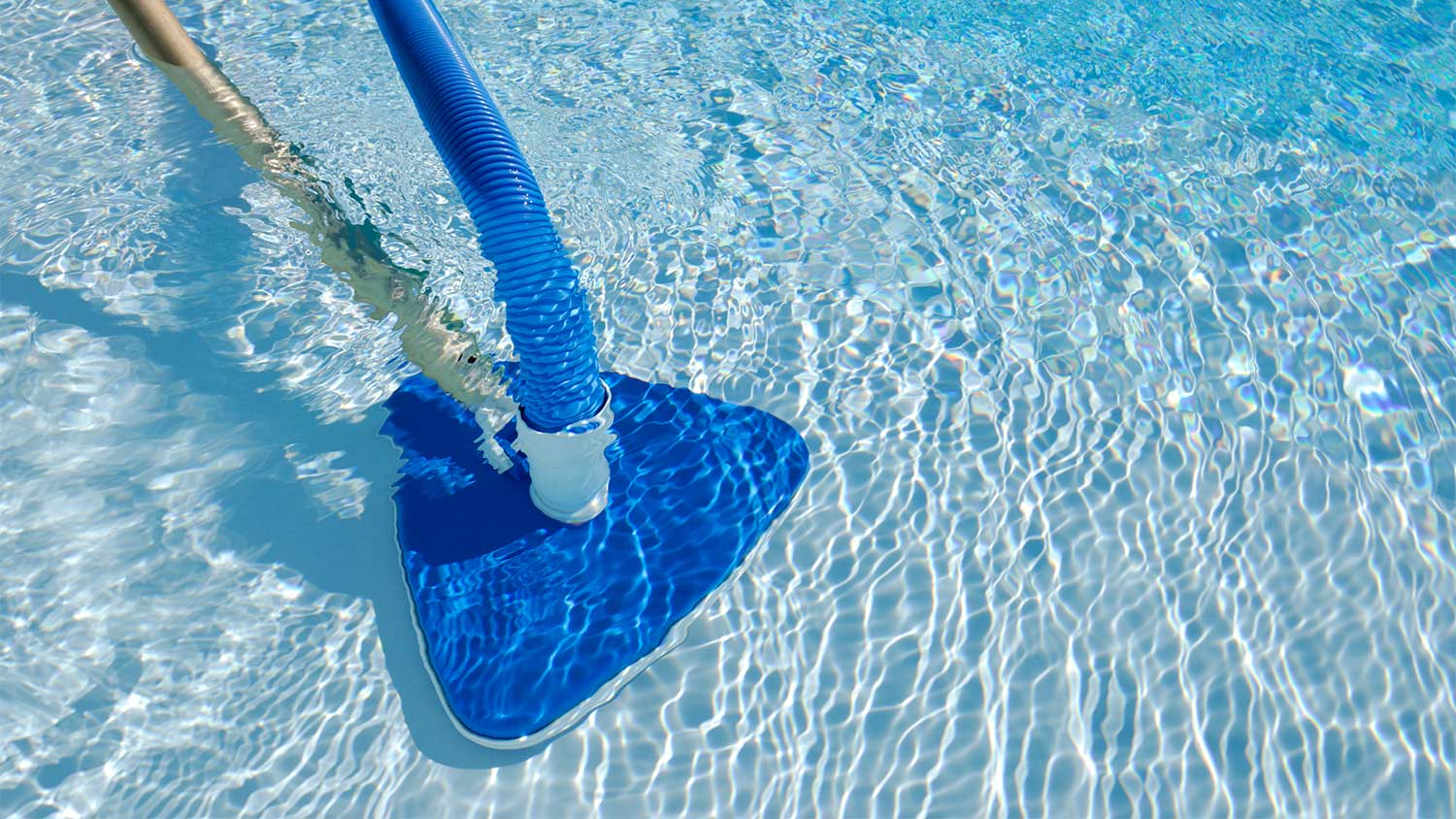The Beginner’s Guide to DIY Pool Maintenance
Proper maintenance will help your journey as a new pool owner go swimmingly


Test your chlorine, pH levels, and total alkalinity weekly.
Be sure to shock your pool regularly with a high dose of chemicals.
Skim your pool daily; brush and vacuum weekly.
Check your filter pressure and skimmer baskets regularly.
If only pool ownership was as simple as filling your pool and rolling with the waves. Along with the cannonballs and lazy afternoons on your flamingo raft, there is important maintenance work to do. Here’s how to stay afloat with everything on your pool maintenance 101 list.
Maintaining the Chemical Balance in Your Pool Water
Proper pool water chemistry prevents your clear-blue swimming pool from turning into a swamp of algae and germs, so it’s a crucial pool maintenance 101 task. Specifically, pay close attention to the chlorine, pH levels, and alkalinity, all of which work together to keep your pool clean and beautiful.
Chlorine keeps germs and algae from spreading through the water. A pool’s pH level measures the acidity of the water on a scale from zero to 14, with a pH of 7 being neutral. A higher level is alkaline and stops germ-killing chemicals from working, while a lower level is acidic and can damage your pool and its components. The pH level needs to be in the middle, between 7.4 and 7.6.
Pool supply stores sell chemicals needed to raise and lower pH and total alkalinity levels. To keep your pool clean and fresh, use testing strips to check the chlorine and pH levels weekly, and the alkalinity monthly.
Also, be sure to include pool shock in your weekly pool maintenance schedule and whenever there’s heavy rainfall. This is a high dose of chemicals to destroy any bacteria that outlasted your regular pool chemicals.
Another simple DIY pool hack is to use baking soda in your pool to balance the pH. This kitchen staple is naturally alkaline, which makes it deal for quick and easy pool maintenance. In fact, many pool products contain baking soda as an active ingredient.
Equipment for Swimming Pool Maintenance

Beyond the chemicals, there are a few essential pieces of equipment you need to maintain your pool. Some are necessary, while others will make your life a lot easier when cleaning.
Skimmer Net and Pole
You’ll need a skimmer net and pole to remove leaves, creepy-crawlies, and whatever else found its way into your pool. Skim your pool at least once a day to keep all that icky debris at bay.
Pool Brush and Vacuum
At least once a week, you should brush down the walls of your pool and give the floor a thorough go-round with the vacuum. Automatic pool vacuums are something to consider as well, though they will only take care of what’s on the bottom of the pool. You’ll still need to skim regularly to keep all the gross floaty stuff out.
Pool Cover
Pool covers are an excellent tool to help keep the water clean while the pool is not in use. You can also consider a solar pool cover to help your pool water stay warmer.
Pool Pump
Moving water stays cleaner and is far less prone to algae growth. It’s best to keep your pump on 24/7, or at least 10 to 12 hours per day if that doesn’t fit into your budget or equipment capabilities. As a bonus, the circulating water will help keep frogs out of your pool since they much prefer still water for bug hunting.
Checking Your Filter and Skimmer Baskets
Your pool’s filter traps dirt and other icky debris, keeping it out of the water. To know when to clean it, keep an eye on the water pressure. This is measured in pounds per square inch (psi), and the starting psi varies per pool. Once the pressure reaches 8 to 10 psi beyond its starting point, it’s time to clean the filter.
Along with that, another maintenance 101 task is to check your pool’s skimmer baskets daily if possible. Grab whatever leaves and debris you find and toss them aside.
DIY Swimming Pool Maintenance vs. Hiring a Professional Pool Service
If you’ve got the time, most pool maintenance tasks are DIY-friendly. However, if you’re in too deep, a local pool cleaning service can help you spend less time cleaning and more time splashing. Professional swimming pool maintenance costs around $80 to $200 per week on average for basic cleaning and skimming, with more complex tasks going higher on the price scale.
Whether or not you spring for weekly maintenance, it’s always a good idea to hire out for an annual pool inspection. This may help you detect small problems before they have you in over your head.





- Swimming Pool Installation
- Pool Liner Replace & Install Companies
- Above Ground Pool Contractors
- Pool Remodeling Companies
- Inground Pool Companies
- Pool Removal Companies
- Inground Pool Repair Companies
- Sauna Companies
- Hot Tub Companies
- Sauna Repair
- Fiberglass Pools
- Pool Designers
- Pool Pump Repair
- Pool Closing Services
- Solar Pool Heater Installers
- How To Clean an Above Ground Pool To Keep It Crystal Clear
- 8 Pool Cleaning Tips You Need to Try This Summer
- Pros and Cons of Filling In a Pool With Dirt
- How to Hire a Swimming Pool Maintenance Pro
- 10 Things to Consider When Building a Pool
- How to Design Your Dream Pool
- 5 Common Pool Care Mistakes You Should Avoid
- 7 Must-Have Pool Upgrades For Your Swimming Pool
- Pros and Cons of Owning a Pool
- Why Is My Pool Green and How Can I Fix It?










